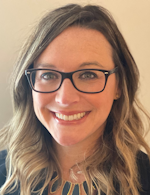How dental hygienists can confidently treat special needs patients: Insights from an expert (part 2)
Editor's note: This is part two of a two-part series on special needs patients. Read part one here.
Welcome back to part 2 of this series. In part 1, I mentioned the continuing education conference I attended at the Medical University of South Carolina (MUSC) in August 2024, which inspired me to raise awareness on special care dentistry. The Dr. Carlos F. Salinas Continuing Education Program has been offered for 25 years. It is held in honor of Dr. Salinas, who dedicated his career to treating patients with special health-care needs.
The 26th annual Dr. Carlos F. Salinas Dental Program will be held in Charleston, SC, on October 3, 2025. If you practice close to the area or would like to learn and visit Charleston, this would be a fantastic opportunity.
Michelle Ziegler, DDS
Dr. Michelle Ziegler, who started her career as a dental hygienist, is an associate professor and chairs the special care dental clinic at MUSC. The clinic utilizes dental students to provide care to adults ages 17 and above. They see patients with both congenital and acquired disabilities. Patients younger than 17 years of age are seen in the pediatric dental clinic.
I spoke with Dr. Ziegler to learn more about their dental clinic. She shared that the D-3 dental students assist the D-4 students who perform hygiene services. The students learn about patient management and how to modify procedures to enable treatment to be rendered in the clinic setting. These modifications can be as simple as keeping the lights lower or playing music, all depending on the patients being seen.
I asked Dr. Ziegler what she would like to share with hygienists about treating patients with special health-care needs in private practices. She recommended that hygienists “open our hearts to offer care to these patients. Many times, simple modifications can make all the difference in being able to treat patients in your practice and not having to refer.”
Brooke Fukuoka, DMD
Brooke Fukuoka, DMD, practices in Jerome, Idaho. She and I met at the National Mobile & Teledentistry Conference in 2020. Dr. Brooke is an innovative and fierce advocate for her patients. She has both a private and public health practice. Her public health practice, Advanced Delivery Dental Clinic, serves adults with special health-care needs exclusively. Dr. Brooke frequently collaborates with physicians to safely provide care for medically complex patients, and she and her team provide personalized care to help patients who need to overcome sensory issues or fears. They utilize special materials and minimally invasive techniques, such as SMART restorations and chemical treatment of caries, to facilitate in-office care. The team consists of two receptionists, two dental assistants, and one hygienist.
Dr. Brooke’s private practice is Your Special Smiles PLLC. The team consists of three hygienists, three hygiene students, and a CNA-turned-dental assistant. They serve two assisted living facilities in Jerome, Idaho, where they run a home hygiene program and provide preventive and teledentistry services coupled with referral. This practice alone runs at a monetary loss. To offset this loss, Dr. Brooke solicits grants to run the program, and she also gives CE courses and donates her speaker honorariums to the program. This practice is currently receiving an HRSA subgrant.
When asked what she would like to share with the hygiene community concerning treating patients with special health-care needs, Dr. Brooke replied, “While most hygienists are already seen as patient, kind, and understanding professionals, when practicing special care, they need to exhibit these traits in the extreme. Special care dentistry can be an emotional roller coaster for both the patient and the provider. Special care hygienists need thick skins and strong emotional control. They also need to be excellent at thinking outside the box and troubleshooting. Though routines are nice to have, the ability to stray from routine when appropriate is essential. Special care hygienists need advanced knowledge of how to handle medical and behavioral emergencies and must thoroughly review a patient’s medical history in collaboration with the dentist.”
When asked what led them to treating this population, Dr. Brooke and her team shared their answers. Dr. Brooke said, “I enjoy working with unique populations and unique people. I love diversity in all things. When I go to a restaurant, I always want a sampler platter and to try everyone else’s meal. I think my desire for variety is what drives me to special care. In general dentistry, our procedures can become rather routine. In special care, we sometimes need to break routine and troubleshoot. I enjoy outside-the-box thinking. Also, in special care, to be successful we need to take additional time to get to know our patients and their unique needs. This has provided the opportunity to meet some remarkable individuals with whom I may not have had the privilege to interact otherwise.”
Dr. Brooke’s team
Vaughn Hixson, RDH, said, “When the opportunity of working with the Advanced Dental Delivery Clinic with Family Health Services came up, it was a very easy and clear choice for me. I grew up with neurodiversity in my life, so it was something that was comfortable and familiar to me. Part of my interview included interacting with a few of our patients. It was difficult for me to hold back tears as I instantly connected with them and wanted to be a part of their journey in improving their oral health. Since then, all my expectations have been blown out of the water, and I have learned so much more than I could have even imagined.”
Tari Devaney, RDH, BSDH, MSDH, FADHA, said, “My special needs son was not receiving the care he needed. I found his care providers did not understand the importance of oral health care. The only time his teeth would get brushed was when I would visit him. While writing my master’s thesis, I found that most care providers do not have the oral health knowledge or the training required to care for the oral health needs of individuals with special needs. I wanted to bridge that gap.”
Bailey Price, RDH, and Kami Richardson, RDH, were classmates, and they both worked with Your Special Smiles PLLC as students. When they graduated, they both asked if they could continue to serve the patients as hygienists. During their rotations, they developed a deep love and friendship with the patients. In hiring them, Your Special Smiles tripled their hygiene capacity. They now serve as mentors to the students and help run the home hygiene program.
Resources to get started
I spoke with a small number of colleagues and experts, but there are many out there with knowledge on how to successfully treat these patients within your clinics and offices. There are also resources, organizations, and conferences that can help you connect with these communities.
One organization is Special Care Dentistry Association (SCDA). This organization is specific to dental, and you will find exceptional content with them. They also host an annual conference where you can go and network and connect with colleagues while earning CE credits. Another organization is the American Academy of Developmental Medicine & Dentistry (AADMD). This is an interdisciplinary group that offers great content on medical/dental integration and treating patients with intellectual developmental disabilities. On the Your Special Smiles PLLC website, there are multiple free educational pages with several free resources. You can also read Lisa Curbow’s book, Unlocking Smiles.
In conclusion, there are some overarching themes in both parts of this article. The experts all shared that they go about treatment in a different way. In many instances, more time is needed and getting creative is important. But the goal is the same. We want these patients to receive the best oral health care possible and in a way that is dignified and atraumatic. One thing that every person shared with me was how rewarding they find their work and how they truly love working in special care dentistry.
Thank you for joining us as we explored the world of special care dentistry. I feel we have only scratched the surface of an opportunity that exists in this population. I have enjoyed learning from our colleagues and with all of you through this series.
Editor's note: This article appeared in the April/May 2025 print edition of RDH magazine. Dental hygienists in North America are eligible for a complimentary print subscription. Sign up here.








